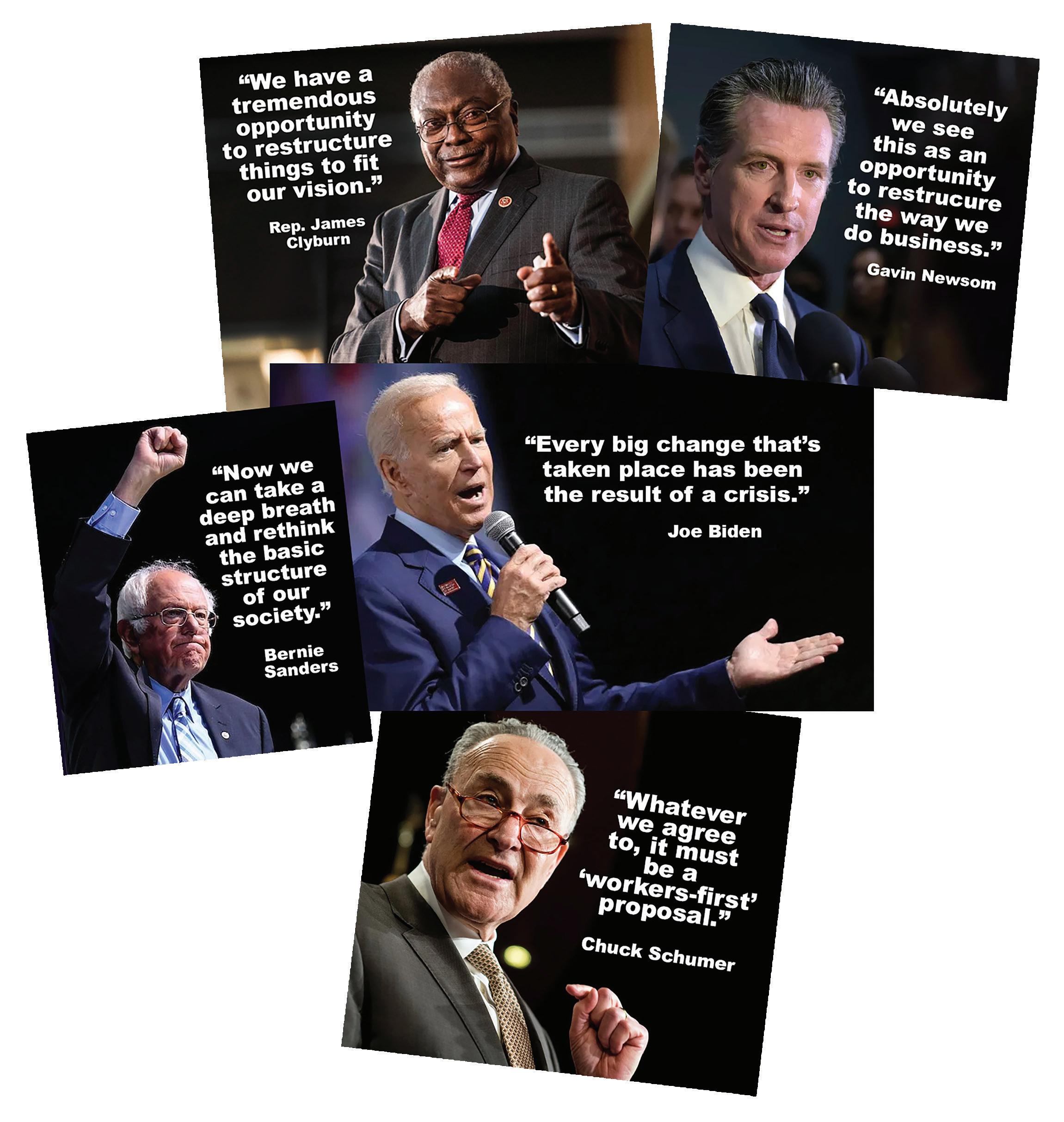
9 minute read
Shotgun Wedding
SHOTGUN WEDDING
Since the whole point
Advertisement
of being represented by a labor union in the first place is to obtain better wages, benefits and working conditions than those who aren't, you'd think unions would make it their business to ensure nonmembers were never covered by a collective bargaining agreement they hadn't shared the cost of negotiating. By MATT HAYWARD
Outreach Director
But if that's what you thought, you’ve obviously fallen for the union canard about their concern for the best interests of their members rather than what benefits the union leaders and, just as
So-called 'forced representation' may not
importantly, the politicians being corrupted with someone else's
help non-unionized workers dues money.
In fact,
or dues-paying members, but the the last labor bosses are pretty excited about it.
thing unions want is to disassociate themselves from what they derisively call “free riders.”
What they really want is to go back to the good, old days when everyone was a “forced rider.”
It works like this: Unions complain loud and long about being required to represent every worker in a given bargaining unit, even those not paying dues. But it wasn’t the workers who insisted on unions being required to represent everyone. It was the unions who lobbied for and/or wrote their states' collective bargaining laws in the first place.
In unions’ perfect world, employees would still be forced to choose between paying full dues and being fired. But failing that, they’d settle for an arrangement under which even those who choose not to join the union are still charged a so-called “agency fee” to compensate the union for providing representation services the worker manifestly doesn't want.
There’s just one tiny problem with such a scheme— it’s unconstitutional.
That was the conclusionof no less than the U.S. Supreme Court when it ruled in Janus v. AFSCME (2018) that compelled union dues— or fees — are a form of forced political speech, which violates the First Amendment.
In the wake of the ruling, thousands of government employees all around the country have left their union, but not without a fight — typically one that involves a union leader crying real tears in front of a legislative committee about how ungrateful workers are getting the benefit of union representation without paying for it.
The answer to their manufactured problem is simple— just drop the legal obligation for unions to represent both members and nonmembers. Let the unions speak for their members while the unrepresented workers negotiate their own compensation packages, like 90 percent of the U.S. workforce does.
What unions want is akin to the government granting adivorce, then ordering one of the parties to allow the other to speak for and legally represent them.
First, it isn't up to the provider of a service to determine whether it is or isn’t a benefit. That privilege belongs to the consumer — in this case, the worker. If he or she believes union representation is beneficial, they’re free to pay for it. But if not, they can no more be forced to pay for something they don’t want than the union can be to provide it for free.
Perhaps more fundamentally, the court recognized the business of negotiating a contract is inherently an exercise in political speech because it necessarily involves elected leaders and public employees haggling over the taxpayers’ money.
And if political speech can't be compelled, neither can the dues dollars that pay for it.
By any objective standard, forced representation is just as unconstitutional as forced dues or union membership.
And the practice is even less justifiable on practical grounds.
Forced representation, for example, grants the union from whom the worker has just obtained a divorce access to his or her personal contact information, which it then may use to harass him or her into resuming the relationship.
Can you imagine the outrage if a wife or husband asked for a divorce from their abusive spouse, only to be ordered by the court to meet regularly and receive counseling from them?
Not only is it impossible for these public employees to prevent the union from contacting them, but the state actually requires it.
Take Service Employees International Union (SEIU) 775 as an example. SEIU 775 has a monopoly on representing Washington state’s individual homecare providers (IPs). Workers who are not members and do not pay union dues are still required by the state to obtain training offered exclusively by SEIU to maintain their certification.
For an IP to find out when and where the mandatory training is, they must contact the union. Not surprisingly, every IP who contacts the union is solicited and harassed to sign up or re-sign an irrevocable union membership card that provides direct access to the worker’s bank account.
IPs who refuse to sign have been guilted, shamed, hung up on and treated poorly.
Public employees who’ve left their union are prevented from negotiating their own contract with the state, not to mention having their privacy rights violated by unions granted access to their personal information.
Those workers may then be forced to endure coercive union solicitations, which are just as unconstitutional and harmful as compelling them to pay for the so-called privilege.
How can union supporters justify this behavior?
No argument against right-to-work protectionsisasfammiliaras the “free rider” argument. Allowing someone to opt out of paying for a service being provided — even against the recipient’s wishes — isobviouslya point of moral outrage to those footing the bill.
But why are employees who exercise their rightnot opt out — or never joined in the first place — still covered by the union-negotiated collective bargaining contract?
Why does the union represent nonmembers, sometimes against their will?
The National Labor Relations Act, passed in the 1930s,governs private-sector unions and first established the practice of exclusive representation. The Supreme Court later upheld the law in National Labor Relations Board v. Jones and Laughlin Steel, and it continues to provide unions the excuse to represent the employees in a particular workplace exclusively.
But public-sector unions are governed by state law, not federal law. Each state that allows collective bargaining determines its own rules and regulations around the arrangement. It would be difficult to imagine a scenario in which unions were not involved in the writing and lobbying of these laws.
The next time you hear someone make the “free rider” argument, ask if they’d support allowing those workers to be free to represent themselves.
Most people will say yes.
The glaring exception to this rule is union leaders, who enthusiastically support the concept of “exclusivity.”
When Doug Pratt, a lobbyist for the Michigan Education Association, was asked in a state Senate committee hearing if the union would like the option of not representing nonmembers, his response was, “No.”
An average, rank-and-file union member is—and should
Bill proposed in Congress could end forced representation first in private sector, then government
Last November, U.S. Reps. Dusty Johnson (R-SD), Greg Murphy (R-NC) and Dr. Phil Roe (R-TN) introduced the Worker’s Choice Act, which would amend the National Labor Relations Act to empower employees in a unionized workplace to independently negotiate their employment terms with their employer.
The bill, HR 5147, is currently under consideration in the House Education Committee and, although it only affects private-sector workers as currently drafted, the measure could serve as a model that could be adapted for government employees, as well.
In Right-to-Work states like those represented by the authors of the measure, an employee who opts out of union participation is still subject to the collectively bargained employment terms negotiated by the union.
The National Labor Relations Act provides unions with exclusive bargaining power, but under the Worker’s Choice Act, workers will not be forced to have unions represent their interests and dictate employment terms.
The Worker’s Choice Act is supported by Heritage Action, FreedomWorks, Americans for Prosperity, the Institute for the American Worker, the Competitive Enterprise Institute, the Center for Worker Freedom, Americans for Tax Reform and the Club for Growth.
“Employees deserve their own negotiating power,” said Johnson. “The Worker’s Choice Act allows American workers in union shops to set their own terms with their boss, the employer.”
“Ending exclusive representation would be a huge victory for workers’ freedom,” Murphy said. “Jobs today are more unique, and many workers want more flexibility
You got nothing to Worry about, Pal.

I'll give My union the Best representation your money can buy.
and opportunity than rigid union-negotiated contracts provide. Ending this relic of the past would free unions from having to represent non-dues paying members and it would free workers to choose their own method of negotiations—including one that does not force them into employment contracts that don’t represent what they want and need.”
“With the rapid growth of the U.S. economy, and more job openings than job seekers, workers are benefiting like never before,” said Rep. Roe. “I am proud to join my friend and colleague Congressman Dusty Johnson in supporting this commonsense piece of legislation to help empower workers to choose their workplace representation and to earn higher wages.”
be—on board with changing the long-standing policy of exclusive representation and insist his or her union devote its time and resources to negotiating only for dues-paying members.
Nonmembers should not be guaranteed or required to have the same wages, retirement, etc.
No person should ever be forced to pay for a service voluntarily provided by someone else. No one can show up at your house, mow your lawn and leave you a bill simply because they claim you benefited from the exchange.
That would be insane, and so is a group of public employees telling someone they’re going to represent them whether they like it or not.
If a person does not ask for your help, regardless of your actions, it is not rational to claim that person could owe you anything. If you do something for someone unsolicited, that is a charitable act, not a payable service.
Unions can’t have it both ways. They can’t demand a monopoly on representation, lobbying for and requiring the exclusive right of representation, and also complain about “free riders.”
If they want to do away with socalled free riders, why not support allowing workers to have their voices back?Why don’t they stop insisting on speaking for people who never asked them to?
Representing people against their will is not a noble action; it is done to stifle competition, to create a monopoly and to provide a bogus moral argument to use guilt and shame as tools against those that do not want to be affiliated with a private organization as a condition of employment.
And it needs to stop.
Liberal Flim-Flam Machine








